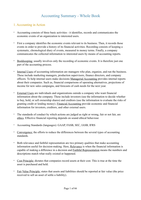Summary
Accounting Summary - Entire Book
- Course
- Institution
Hi everyone! No time to read the whole Accounting book or just need some help? Here is a summary of everything we need to know for the Accounting Final Written Exam. Good luck studying!
[Show more]



